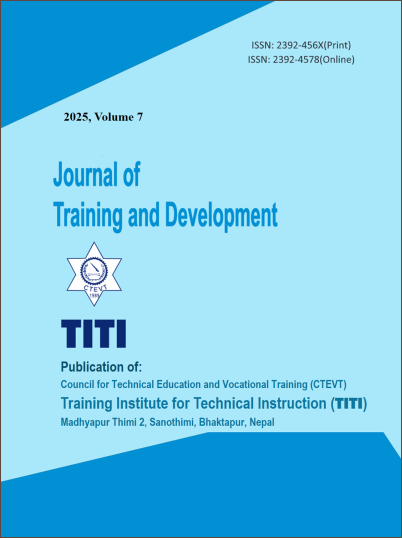Prospects and Challenges of Executing the Work-Based Learning Approach in Nepal
DOI:
https://doi.org/10.3126/jtd.v7i1.74983Keywords:
technical and vocational education and training, workplace-based learning, world of workAbstract
This study was carried out to scrutinize the prospects and challenges of instigating the work-based learning (WBL) approach in TVET in Nepal. A qualitative methodology was adopted for the study. Face-to-face and virtual in-depth interviews were conducted with purposively identified TVET experts, teachers and employers from Nepal. Altogether, there were 15 participants. Primarily, the study addressed two research questions: (i) What are the prospects and challenges for instigating a work-based learning approach in TVET in Nepal, and (ii) How the challenges are tackled? The findings revealed that stakeholders' readiness and the industry's volume to meet learners' needs are key challenges in instigating work-based learning approaches in Nepal. The findings also revealed that the prevailing legal frameworks and practices do not have significant provisions. This urges for a conducive legal framework that makes employers mandatory for providing work-based learning opportunities to TVET students in their industries. The industry volume needs to be increased and strengthened by creating a conducive environment for private sector and foreign investment. Additionally, awareness needs to be made among the stakeholders, especially the guardians and the students, so that the guardians understand the importance of WBL and encourage their children to join and the students to be ready for learning in work-based settings.
Downloads
Downloads
Published
How to Cite
Issue
Section
License

This work is licensed under a Creative Commons Attribution 4.0 International License.
Authors who publish with this journal agree to the following terms:
- Authors retain copyright and grant the journal right of first publication with the work simultaneously licensed under a Creative Commons Attribution License that allows others to share the work with an acknowledgement of the work's authorship and initial publication in this journal.
- Authors are able to enter into separate, additional contractual arrangements for the non-exclusive distribution of the journal's published version of the work (e.g., post it to an institutional repository or publish it in a book), with an acknowledgement of its initial publication in this journal.
- Authors are permitted and encouraged to post their work online (e.g., in institutional repositories or on their website) prior to and during the submission process, as it can lead to productive exchanges, as well as earlier and greater citation of published work (See The Effect of Open Access).




